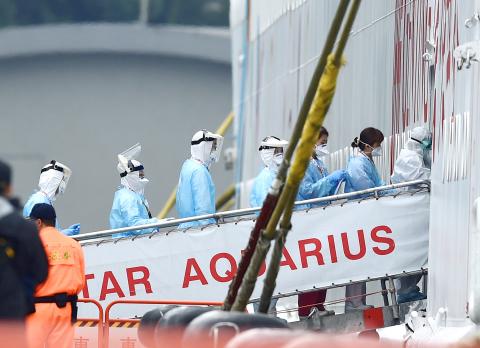The SuperStar Aquarius cruise ship carrying more than 1,700 Taiwanese passengers docked at the Port of Keelung at 11:30am yesterday and 128 passengers were tested for 2019 novel coronavirus (2019-nCoV) infection, including one person with a travel history to Wuhan, China.
Minister of Health and Welfare Chen Shih-chung (陳時中), head of the Central Epidemic Command Center, in the morning told a news conference that all of the passengers who had been in China recently or had symptoms of infection would be tested for the virus.
All of the results were negative for 2019-nCoV, the center said last night, so everyone onboard would be allowed to disembark and asked to monitor their health for 14 days.

Photo: Chien Jung-fong, Taipei Times
If a test had been positive for the virus, all of the passengers and crew would have been quarantined on the ship, Chen said.
Although Star Cruises (麗星郵輪), the Hong Kong-based company that operates the ship, said that no one onboard had been in China recently, government information showed that 19 passengers had visited China in the past 14 days and 41 had visited China in the past 30 days, Chen said, adding that the 41 passengers and 29 non-Taiwanese passengers were to be tested.
After boarding the SuperStar Aquarius with disease prevention officers at noon, Chen said that they took samples from 128 people for testing.
The results were available at 9pm.
More than 2,400 passengers and crew were examined for fever or respiratory symptoms, and while no one had a body temperature of 38°C or above, they expanded the criteria for 2019-nCoV testing to include people who had visited China, including Hong Kong and Macau, in the past 30 days, people with an unknown travel history, and those with respiratory symptoms or a body temperature of 37.2°C or above, Chen said.

FREEDOM OF NAVIGATION: The UK would continue to reinforce ties with Taiwan ‘in a wide range of areas’ as a part of a ‘strong unofficial relationship,’ a paper said The UK plans to conduct more freedom of navigation operations in the Taiwan Strait and the South China Sea, British Secretary of State for Foreign, Commonwealth and Development Affairs David Lammy told the British House of Commons on Tuesday. British Member of Parliament Desmond Swayne said that the Royal Navy’s HMS Spey had passed through the Taiwan Strait “in pursuit of vital international freedom of navigation in the South China Sea.” Swayne asked Lammy whether he agreed that it was “proper and lawful” to do so, and if the UK would continue to carry out similar operations. Lammy replied “yes” to both questions. The

SECOND SPEECH: All political parties should work together to defend democracy, protect Taiwan and resist the CCP, despite their differences, the president said President William Lai (賴清德) yesterday discussed how pro-Taiwan and pro-Republic of China (ROC) groups can agree to maintain solidarity on the issue of protecting Taiwan and resisting the Chinese Communist Party (CCP). The talk, delivered last night at Taoyuan’s Hakka Youth Association, was the second in a series of 10 that Lai is scheduled to give across Taiwan. Citing Taiwanese democracy pioneer Chiang Wei-shui’s (蔣渭水) slogan that solidarity brings strength, Lai said it was a call for political parties to find consensus amid disagreements on behalf of bettering the nation. All political parties should work together to defend democracy, protect Taiwan and resist

By refusing to agree spending increases to appease US President Donald Trump, Spanish Prime Minister Pedro Sanchez threatened to derail a summit that NATO Secretary-General Mark Rutte needs to run smoothly for the sake of the military alliance’s future survival. Ahead of yesterday’s gathering in The Hague, Netherlands, things were going off the rails. European officials have expressed irritation at the spoiler role that Sanchez is playing when their No. 1 task is to line up behind a pledge to raise defense spending to 5 percent of GDP. Rutte needed to keep Spain in line while preventing others such as Slovakia

SHIFT PRIORITIES: The US should first help Taiwan respond to actions China is already taking, instead of focusing too heavily on deterring a large-scale invasion, an expert said US Air Force leaders on Thursday voiced concerns about the Chinese People’s Liberation Army’s (PLA) missile capabilities and its development of a “kill web,” and said that the US Department of Defense’s budget request for next year prioritizes bolstering defenses in the Indo-Pacific region due to the increasing threat posed by China. US experts said that a full-scale Chinese invasion of Taiwan is risky and unlikely, with Beijing more likely to pursue coercive tactics such as political warfare or blockades to achieve its goals. Senior air force and US Space Force leaders, including US Secretary of the Air Force Troy Meink and